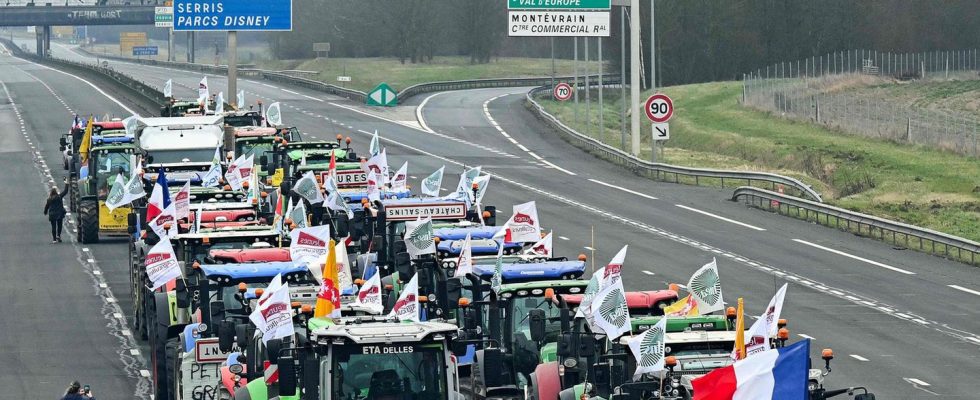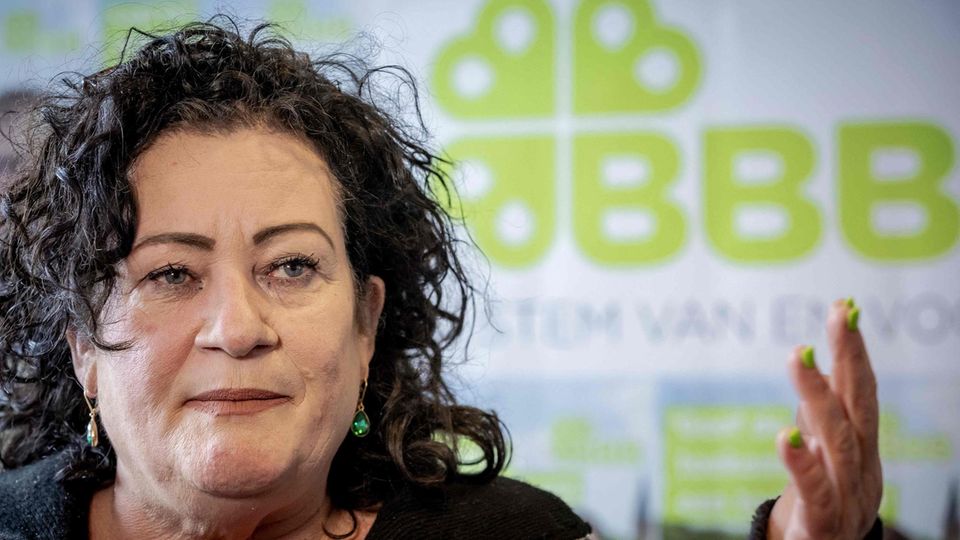The farmers’ protests in Germany are spreading to other European countries: In France, farmers want to block Paris, and tractors are also rolling in convoys in Romania and Lithuania. And in the Netherlands, protesting farmers may soon be in government.
On Monday tractors rolled through Hamburg again. They blocked roads under the motto “Against tax and bureaucratic madness.” Sometimes nothing worked on the traffic arteries for several hours. “We counted around 550 tractors between Grindelallee and Alsterglacis,” said a police spokesman on Monday. The police had expected around 1,500 tractors. In the south of Hamburg, farmers also blocked the streets around the port with an unannounced demonstration.
German farmers have been protesting for weeks against the federal government’s decision to no longer subsidize agricultural diesel and to allow the vehicle tax exemption for agricultural vehicles to expire. The traffic light coalition has now rowed back: the agricultural diesel allowance is to be gradually reduced by 2026, and the planned abolition of the vehicle tax exemption for agricultural vehicles is completely off the table.
Peasant protests in Romania, Italy, Poland and Belgium
The German tractor parades have now become a model and catalyst for further farmers’ protests in Europe: In Belgium, numerous farmers took part in protest actions. On Sunday, several dozen tractors blocked a highway in the south of the country.
In Lithuania, several thousand farmers resisted the austerity plans and agricultural policy of the government of the Baltic EU country. They are dissatisfied with the protected area regulations, their income situation and the milk prices. As in Germany, Lithuanian farmers are also concerned about fuel prices.
Farmers in Poland have been resisting duty-free imports of Ukrainian grain for months, saying they would hurt their prices. Farmers’ protests are also being reported in Italy.
A line of tractors at a demonstration by farmers in Brescia, Italy
© Spada/LaPresse via ZUMA Press / DPA
France: Blockades on highways
One of the focal points of the European farmers’ protests is currently France and especially its capital Paris, where the farmers’ anger has also been venting for months.
On Tuesday, around 200 tractors rolled towards the Rungis wholesale market in Paris. The convoy is expected to reach its destination and block the market in the late afternoon. If this were to succeed, it could have serious consequences: Europe’s largest fresh produce market supplies the greater Paris area with food.
Since yesterday, around 15,000 police officers have been tasked with ensuring that the tractor protest does not come to the capital. The convoy of 200 tractors, which is currently heading towards Paris, was initially stopped by gendarmes. However, the demonstrators managed to bypass the roadblock and onto smaller streets.
Protesting farmers have been blocking traffic around Paris since Monday. With hundreds of tractors and bales of hay, they paralyzed entire sections of the highway. The demonstrators now want to wait for their demands to be implemented in hastily set up protest camps – the largest farmers’ association had presented the government with a list of 140 of them.
Farmers protests
Thousands of vehicles block the center of Berlin – Finance Minister Lindner is booed
“Everyone really shares the feeling that more and more is being asked of them”
Similar to German farmers, French farmers are also interested in lower taxes and better incomes. After highway blockages in the southwest of the country in recent weeks, the government gave in on Friday: the new Prime Minister Gabriel Attal announced that it would withdraw the tax increase on agricultural diesel. Further concessions to farmers are expected.
But the protests continue: A core demand of the largest farmer unions is a more consistent implementation of the so-called “Egalim” laws: Among other things, they regulate the prices for products such as meat and milk. Fixed prices are intended to prevent wholesalers from making profits at the expense of farmers. However, unions criticize that the laws are often not implemented. A lack of controls allows retailers to circumvent regulations. From the farmers’ perspective, the Rungis wholesale market symbolizes France’s misguided agricultural policy.
What unites farmers in different countries? “All European farmers have been fed up for a long time,” said Alessandra Kirsch, head of studies at the Agriculture Stratégies think tank, to the German Press Agency. So far agricultural prices have been quite good. But they have been in decline since the beginning of the year. It doesn’t take much to make the barrel overflow, says the agricultural expert. “Everyone really shares the feeling that more and more is being asked of them.”
The farmers’ protests in the Netherlands became a party
Kirsch sees the European Union’s agricultural policy as the focus of the criticism. This pays tens of billions in subsidies to farmers every year. A large part of this is awarded primarily based on area, but there are also payments that are tied to environmental requirements, for example. The budget is too low and the awarding is no longer up to date.
Such environmental regulations have already led to sometimes violent farmer protests in the Netherlands in 2019 and in subsequent years. The movement gave rise to a populist party, the Farmer Citizens Movement (BBB), which also became an outlet for the general discontent of the Dutch. In the regional elections in spring 2023, the BBB achieved a landslide victory and became the strongest force in all regions. The BBB also made strong gains in the parliamentary elections in October and could now enter government together with the anti-Islam party of right-wing populist Geert Wilders and two other right-wing parties.
For the agricultural sociologist François Purseigle from the INP-ENSAT agricultural college in Toulouse, movements like the BBB and the farmers’ protests in Europe show one thing above all: “How difficult it is for EU agricultural policy to support a large diversity of agricultural models and corporate projects.” However, like expert Kirsch, he emphasizes that the protests should not be lumped together. Depending on the country, there are specific reasons for the frustration.
Before the European elections, the EU is under pressure because of farmers
But the pressure on the EU has increased with the farmers’ protests – especially with a view to the European elections in June. After all, many rules and regulations come from Brussels. Several projects from the EU Green Deal climate protection package are particularly controversial, including a planned renaturation law and a law that is intended to drastically reduce the use of pesticides in the EU. France has already announced that it will push for a weakening of the EU requirements. On Tuesday, Brussels moved: regulations for a minimum proportion of fallow land on arable land should remain suspended – a concession to farmers.
The major solution approach should be a “strategic dialogue” in which agriculture, trade and environmental associations exchange ideas on topics such as income, competitiveness and new technologies. The aim is to overcome the gaps between the environment and agriculture. “Agriculture and environmental protection can go together,” emphasized Commission Chairwoman Ursula von der Leyen.
Until that happens, Europe’s farmers want to continue taking to the streets. Joachim Rukwied, President of the German Farmers’ Association, announced further protests last week.
Sources: news agencies AFP and DPA, FNSEA, “Euractiv”, Kantar, agrarheute.com, FranceInfo, “SudOuest”, “LeMonde”, France 24, German Farmers Association


